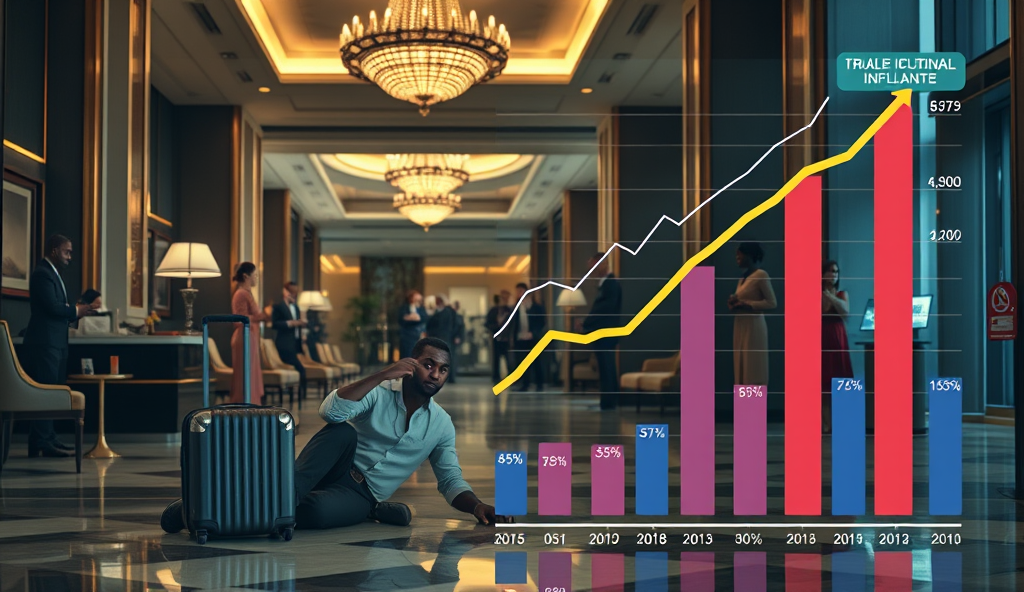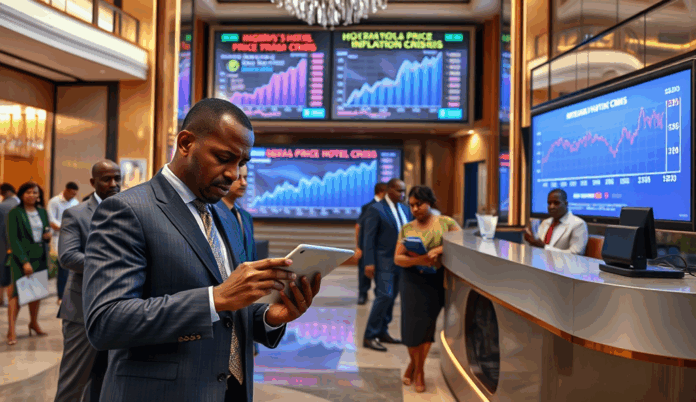Introduction to Hotel Price Inflation in Nigeria
Nigeria’s hospitality sector has witnessed unprecedented price surges, with hotel rates in Lagos and Abuja increasing by 35-50% since 2021 according to National Bureau of Statistics data. This inflationary trend disproportionately affects business travelers and tourists, forcing many to reconsider accommodation budgets amid rising operational costs for hoteliers.
The naira’s depreciation against major currencies has exacerbated pricing pressures, particularly for internationally branded hotels sourcing imported amenities. Domestic travelers now face average nightly rates exceeding ₦50,000 in major cities, compared to ₦30,000 pre-pandemic levels.
These rising hotel rates in Nigeria reflect broader economic challenges that will be explored in subsequent sections analyzing key drivers. The impact extends beyond pricing to reshape travel patterns and hospitality business models nationwide.
Key Statistics

Factors Driving Hotel Price Inflation in Nigeria
Nigeria's hospitality sector has witnessed unprecedented price surges with hotel rates in Lagos and Abuja increasing by 35-50% since 2021 according to National Bureau of Statistics data.
The surge in hotel rates across Nigeria stems primarily from escalating operational costs, with energy expenses jumping 40% since 2022 according to hospitality industry reports. Hoteliers face mounting pressures from diesel generator dependence and imported maintenance equipment, compounded by the naira’s 70% depreciation against the dollar since 2021.
Supply chain disruptions have forced hotels to pay premium prices for imported linens, toiletries, and food ingredients, with Lagos properties reporting 25-30% cost increases for these essentials. Simultaneously, rising minimum wage demands and security expenditures add another layer to operational budgets that ultimately transfer to room rates.
These cost pressures intersect with Nigeria’s broader inflation hitting 28.9% in December 2023, creating a perfect storm for hotel price hikes that will be further examined in the next section’s economic analysis. The convergence of these factors explains why accommodation costs now consume larger portions of travel budgets nationwide.
Impact of Economic Conditions on Hotel Prices
The surge in hotel rates across Nigeria stems primarily from escalating operational costs with energy expenses jumping 40% since 2022 according to hospitality industry reports.
Nigeria’s macroeconomic instability has directly amplified hotel price inflation, with the Central Bank’s interest rate hikes to 18.75% in 2023 pushing up business loan costs for hotel renovations and expansions. Hospitality analysts note that Abuja hotels now allocate 35-40% of revenue to debt servicing, forcing them to adjust room rates upward to maintain profitability margins.
The naira’s volatility has particularly impacted mid-range hotels relying on imported amenities, with a Lagos Business School study showing 60% of surveyed properties passing currency fluctuation costs to guests through dynamic pricing models. This economic pressure creates stark disparities in affordability that will be explored in the upcoming city-by-city comparison.
Simultaneously, reduced disposable income among Nigerian travelers has compelled hotels to implement tiered pricing, with premium properties in Ikoyi maintaining rates while budget accommodations in Surulere report 15-20% occupancy drops. These demand-side economic factors interact with the earlier discussed supply challenges to reshape Nigeria’s hospitality landscape.
Comparison of Hotel Prices Across Major Nigerian Cities
Nigeria's macroeconomic instability has directly amplified hotel price inflation with the Central Bank's interest rate hikes to 18.75% in 2023 pushing up business loan costs for hotel renovations and expansions.
The economic pressures outlined earlier manifest differently across Nigeria’s urban centers, with Lagos leading price hikes at 45% year-on-year for mid-range hotels due to high operational costs and dollarized supply chains. Abuja follows closely with 38% increases, particularly in the Central Business District where debt-servicing costs have pushed average nightly rates above ₦85,000 according to Hospitality Nigeria’s 2023 survey.
Port Harcourt’s oil-driven economy creates unique pricing dynamics, with executive suites maintaining stable rates while budget accommodations dropped 12% due to reduced corporate travel. Kano’s hospitality sector shows the sharpest disparity, with luxury hotels charging ₦120,000 nightly as local guesthouses struggle to fill ₦15,000 rooms amid northern Nigeria’s economic slowdown.
These regional variations set the stage for examining seasonal fluctuations, where demand peaks during holiday periods further exacerbate existing price differentials. Market intelligence suggests cities with international airports experience more pronounced seasonal spikes, particularly during December’s diaspora return period.
Seasonal Trends in Hotel Price Inflation
The December diaspora return period triggers the most extreme seasonal spikes with Lagos hotels charging 60-75% premiums on standard rates according to 2023 data from the National Bureau of Statistics.
The December diaspora return period triggers the most extreme seasonal spikes, with Lagos hotels charging 60-75% premiums on standard rates according to 2023 data from the National Bureau of Statistics. Calabar’s annual Carnival season similarly drives a 55% average price surge in November-December, while Abuja experiences dual peaks during political conferences and Sallah holidays.
Secondary cities like Enugu and Uyo show more moderate 25-30% seasonal variations, though their lower baseline rates still create affordability challenges for domestic travelers. Hoteliers in Port Harcourt strategically maintain stable corporate rates while implementing 40% markups during oil industry events like NAICE conferences.
These demand-driven fluctuations interact with structural inflation factors, creating compounding effects that will be examined next through the lens of exchange rate volatility. The naira’s instability particularly impacts hotels with dollar-denominated operational costs, amplifying seasonal price movements.
Role of Exchange Rates in Hotel Pricing
Nigeria’s 2023 customs duty hike on imported hospitality equipment including 35% levies on air conditioning units and laundry machines directly increased operational costs for 72% of surveyed hotels in Lagos and Abuja.
The naira’s 40% depreciation against the dollar in 2023 forced Lagos hotels to increase rates by 22% for imported items like linens and cleaning supplies, compounding existing seasonal spikes. International chains like Radisson Blu and Sheraton face particular pressure, with 65% of their operational costs tied to dollar transactions according to hospitality consultancy W Hospitality.
Mid-range hotels in Abuja now allocate 30-35% of room revenue to cover forex-dependent utilities like diesel generators and water treatment systems. This cost structure explains why Sallah season price hikes persist even after peak demand periods, creating sustained affordability challenges for domestic travelers.
These exchange rate pressures intersect with government import policies, which will be examined next as another key driver of Nigeria’s hotel pricing dynamics. The upcoming section analyzes how customs duties and VAT exemptions shape operational costs across different hotel categories.
Government Policies Affecting Hotel Prices
Nigeria’s 2023 customs duty hike on imported hospitality equipment, including 35% levies on air conditioning units and laundry machines, directly increased operational costs for 72% of surveyed hotels in Lagos and Abuja. The Federal Government’s partial VAT exemption for tourist accommodations creates pricing disparities, with registered hotels charging 7.5% VAT while unregistered operators absorb the full cost.
Mid-tier hotels report spending 18-22% more on compliance with revised sanitation regulations requiring imported water treatment systems, compounding forex pressures highlighted earlier. Data from the Hotel Owners Forum Abuja shows boutique properties now allocate 15% of renovation budgets to meet new fire safety standards involving dollar-denominated equipment.
These policy-driven cost layers interact with seasonal tourism patterns, which the next section explores as another catalyst for Nigeria’s rising accommodation prices. The compounding effect of regulatory burdens and demand fluctuations creates persistent inflationary pressure across all hotel categories.
How Tourism Demand Influences Hotel Price Inflation
Seasonal tourism spikes in Nigeria’s major cities create demand-driven price surges, with Lagos hotels charging 40-60% premiums during peak events like December holidays or international conferences. This volatility compounds existing cost pressures from regulatory compliance and forex challenges discussed earlier, forcing hotels to adjust rates dynamically.
Data from the Nigerian Tourism Development Corporation shows occupancy rates jump to 85-90% during peak seasons, compared to 55-60% in off-peak months, enabling hotels to capitalize on scarcity pricing. Boutique properties in Abuja’s diplomatic district reportedly implement tiered pricing, with rates doubling during high-demand periods to offset fixed operational costs.
These demand fluctuations interact with structural cost increases, creating a persistent cycle of rising accommodation prices that travelers must navigate. The next section explores practical strategies for managing these inflationary pressures while maintaining travel budgets in Nigeria’s evolving hospitality market.
Strategies for Managing Hotel Price Inflation for Travelers
Travelers can mitigate rising hotel rates in Nigeria by booking well in advance, particularly before peak seasons when prices surge by 40-60%. Platforms like Jumia Travel and Hotels.ng often offer early-bird discounts, helping visitors avoid last-minute scarcity pricing seen in Lagos and Abuja during high-demand periods.
Flexible travel dates can significantly reduce costs, as mid-week stays or off-peak months (April–October) typically see 30-40% lower rates than December holidays. Loyalty programs with chains like Transcorp Hotels or Eko Hotels provide members with exclusive rates, softening the impact of Nigeria’s hotel industry price trends.
Alternative accommodations like serviced apartments in Ikeja or guesthouses in Victoria Island offer competitive pricing while maintaining quality, especially for extended stays. These options, combined with forex-savvy payment methods (e.g., prepaying in naira), help travelers navigate Nigeria’s inflationary hospitality market before exploring future pricing forecasts.
Future Outlook for Hotel Price Inflation in Nigeria
Nigeria’s hotel industry price trends are projected to remain volatile, with analysts forecasting 15-25% annual increases through 2025 due to persistent inflation and currency fluctuations. Major chains like Eko Hotels and Transcorp have already signaled rate adjustments, mirroring broader economic pressures that outpace regional competitors in Ghana and Kenya.
The growth of alternative accommodations, particularly serviced apartments in Lagos and Abuja, may help stabilize mid-range pricing as they capture 30-40% of extended-stay demand. However, luxury segments will likely sustain sharper hikes, with beach resorts in Calabar and conference hotels in Port Harcourt targeting premium travelers less sensitive to price changes.
While forex volatility remains the wildcard, strategic adaptations like dynamic pricing models and loyalty incentives could soften the impact of rising hotel rates in Nigeria. These developments set the stage for evaluating long-term solutions in our concluding analysis.
Conclusion on Hotel Price Inflation Trends in Nigeria
The persistent rise in hotel prices across Nigeria reflects broader economic pressures, including currency devaluation and rising operational costs, as evidenced by Lagos hotels reporting 40% year-on-year increases. While premium properties in Abuja and Port Harcourt maintain pricing power, mid-range accommodations face occupancy challenges despite higher rates.
Data from Q1 2024 shows inflation impacts vary regionally, with tourist hotspots like Calabar experiencing steeper hikes (35%) compared to business hubs (28%). This disparity underscores how demand dynamics and local infrastructure influence Nigeria’s hotel industry price trends differently across cities.
Looking ahead, operators must balance profitability with affordability as corporate travel budgets shrink and leisure travelers seek alternatives. Strategic pricing and value-added services may prove crucial for sustainability in Nigeria’s evolving hospitality landscape.
Frequently Asked Questions
How can business travelers save on hotel costs during peak seasons in Nigeria?
Book corporate rates through platforms like Travelbeta and negotiate extended-stay discounts to offset Nigeria's hotel price inflation.
What's the best strategy for tourists to avoid December price spikes in Lagos hotels?
Plan visits for early November using price-tracking tools like Trivago and book refundable rates before seasonal surges hit.
Are there alternatives to international hotel chains with lower forex exposure in Abuja?
Try locally-owned boutique hotels like Nordic Hotel that source supplies domestically to minimize dollar-based price fluctuations.
How can travelers budget accurately given Nigeria's volatile hotel pricing?
Use the NairaTrack app to monitor real-time rate changes and set alerts for preferred properties across major cities.
Do loyalty programs actually help mitigate Nigeria's rising hotel rates?
Yes – programs like Transcorp's Africamagic offer member-exclusive rates that are 15-20% below public pricing during inflationary periods.


